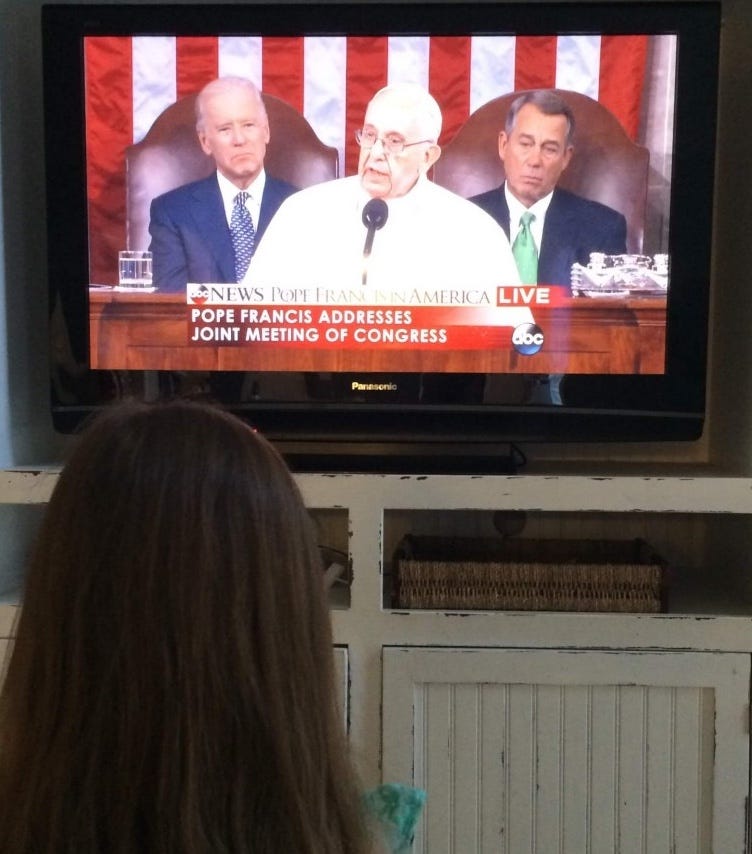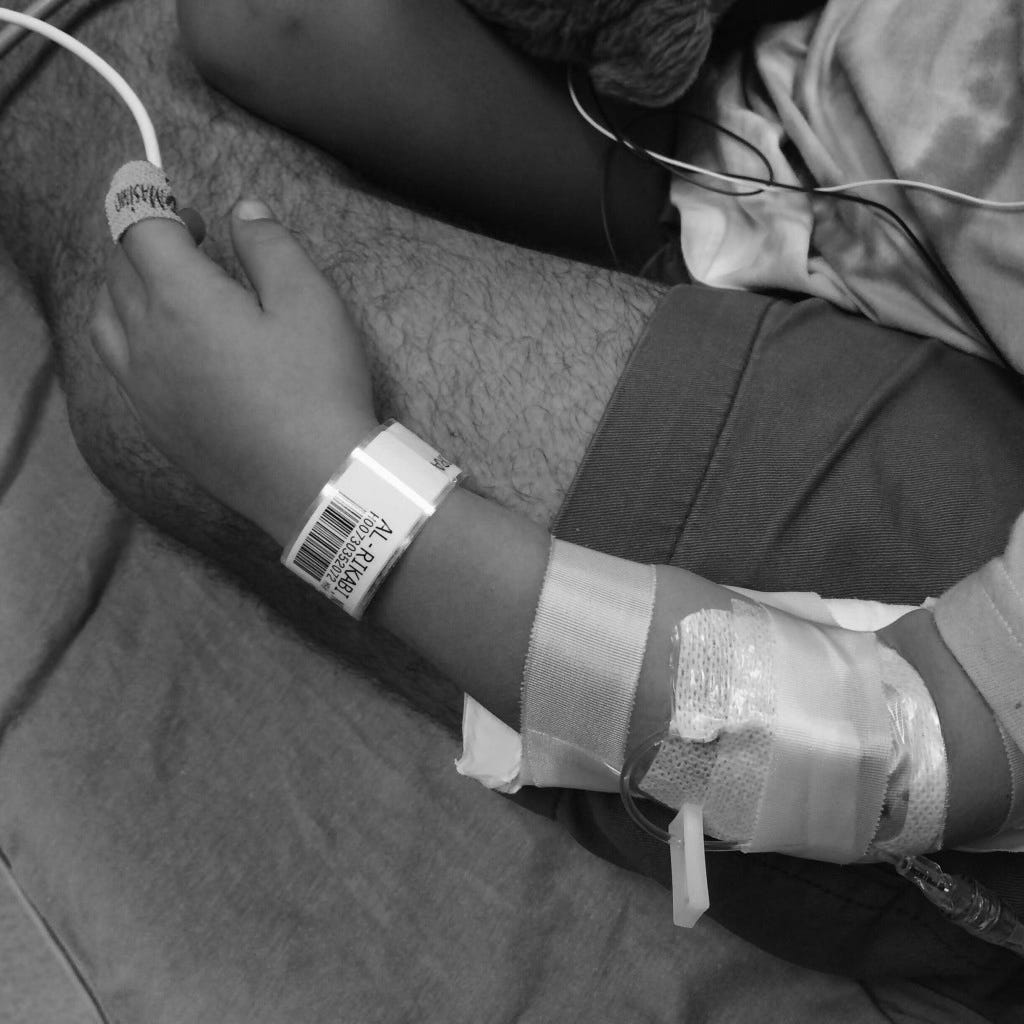
Dad was Muslim by birth, but his real religion was education. “They can take everything you own, but they can’t take your education; they can’t take your mind,” he often told me after seeing my room-temperature report card. So when I got to high school, Dad turned to another religion to shepherd my education: the Jesuits.
“If two Jesuits came into a town,” the saying goes, “the first one would open a high school by breakfast, and the second would open a college by lunch.” These men in black were academic drill instructors, and this terrible student was doomed to wash out.
By the second semester, I was all systems go for a spectacular academic major malfunction. I had Fs in Latin, English, biology, and algebra. But the priests never stopped trying.
One, in particular, was Father Phillips, a short, grey-haired grandfather type with a soft voice. But when he spoke with you he'd lock eyes and never look away, like he knew the secrets of your soul but loved you anyway. His office was next to my locker, and he befriended me. He knew I was struggling, lonely, and had no friends, and he’d invite me into his office during study hall to talk, study, or sit still. “You’re a Methodist? That makes you a third-string Catholic,” he’d joke.
Late in the year, I had a big biology test, and Fr. Phillips wasn’t giving up on me, even with all the writing on the grade-book wall.
“You pass that test,” he said, “and I’ll buy you a Coke.”
Our family ate out a lot in those days, and Dad always ordered a beer in a frozen mug. If it wasn’t frosty enough, he’d send it back. Inspired by Dad, I said, “Make sure it’s in a frozen mug.”
Somehow, I passed the test and triumphantly paraded into his office. Fr. Phillips left his office and returned several minutes later, carrying a tray with two cans of Coke, two frozen mugs, two cookies, and two bananas—my last supper at Jesuit.
That one test wouldn’t save me; we both knew at finals week, I was on the way out. I walked into Fr. Phillips’ office for the last time and said, “Father, may I have your blessing before my last exam? ”
“Of course,” he said as I got on my knees. We both made the sign of the cross, and he placed his hands on my head.
“In the name of the Father, the Son, and the Holy Spirit... I pray for my friend Omar as he prepares for finals and as he prepares for what is next in life. Guide him. Teach him. Mold him into the image of Christ. Amen.”
For all their academic exorcisms, I hold most the memory of Fr. Phillips from my one stint with the Jesuits. They seemed way more chill than the Catholic school horror stories I’ve heard. I once asked him if there’d ever been a Jesuit pope.
He laughed hard and, catching his breath, said, “My son… there will never, ever be a Jesuit Pope.”
+++
One morning, my five-year-old daughter Norah and I sat together watching the first ever Jesuit pope, Pope Francis, address a special joint session of Congress.
“Daddy, is he preaching in a church?”
A church? No. A house of worship? Depends on what you’re worshiping.
Behind the pontiff were the planet's second and third most powerful Catholics: Vice President Joe Biden with his big, bright dental implant smile, and Speaker of the House, John Boehner, probably smelling of cigarette smoke and tears.
Earlier that morning on NPR, the columnist David Brooks described Francis's nature and posture, saying, “[H]e’s operating on a different axis. We normally do politics on a horizontal axis. He's doing a vertical axis; he's a radically countercultural figure. And we talk about self-interest. He's about selfless love.”
After his speech, Francis greeted a roaring crowd of 50,000 from the capitol balcony with, “Buenos dias!” Then he blessed the children in the crowd, calling them “the most important people here!”
“Father of all, bless these. Bless each of them. Bless the families. Bless them all. And I ask you all please to pray for me.”
“What’s he saying, Daddy?” Norah asked, struggling to interpret his accent.
“He’s praying for all the children and asking the people to pray for him,” I said. “That includes you and me.”
+++
Later that day, our family met with some out-of-town friends at their hotel pool. While we unloaded the car, Norah sat on the curb and plopped on a fire ant mound.
Her screams were so rapid, so loud, that I thought she’d been run over. I hoisted her by her arms while slapping ants off her legs and butt like she was a piñata. She had over a dozen bites on her thighs, feet, and between her toes, but she recovered when we reached the pool.
But before she could put on her floaties, Norah fell in the pool, the water covering her head before our friend’s oldest daughter pulled her out. Gasping for air and sobbing, Norah said, “Daddy, I almost drowned-ed.”
She recovered again and, festooned with floaties and a pool noodle, ran with her bestie for the water. But she slipped, falling face-first into a deck chair, slicing her cheek open at the corner where her top and bottom lips met.
The screams. The blood. Sitting in the waiting room in our swimsuits.
Norah sat in my lap while a nurse opened an IV line to sedate her before a pediatric plastic surgeon stitched her mouth back together. While waiting for the meds to kick in, I posted what happened to our family and friends. Norah stared at my phone while I tapped the screen as the meds kicked in.
“Is there anything you want me to tell them?” I asked.
She mumbled with a drowsy voice and a mouthful of gauze, “Pwease ask da people to pway foh me.”
+++
Politics and religion drove me out of the pulpit three years ago. I had to get out of the “soul-saving” business to save my soul. These days, I don’t listen much to Christian podcasts or sermons, read Christian books, or listen to music. After a year in self-imposed exile, we found a church where the pastors knew I was once in the game, so they never asked me to volunteer. It’s a safe place.
Don’t get me wrong, I’m not “deconstructing.”1 I still believe. But for me, these days, the Christian Industrial Complex is like the time I drove my oldest daughter to school, and a Taylor Swift song came on the radio. I hit next, and my daughter said, “Why’d you change it?”
“I thought you didn’t like Taylor Swift,” I said.
“Oh, I like Taylor Swift fine. I just can’t stand most of her fans.”
Without thinking about it, I blurted out, “Yeah, I’m the same way with Jesus.”
So what’s saved my soul and sanity these days? Comedy. Bono says, “Joy is a defiant act against our mortality,” and laughter really is the best medicine. Now I listened almost exclusively to stand-up comedy specials on Netflix, Max, and Prime. I rewatch material from Mike Birbiglia, Gary Gulman, and Taylor Tomlinson; they’re my spirit jesters.
I read and reread the works of David Sedaris, Norah Ephron, and Jimmy Carr, as well as my old collections of The Far Side, Bloom County, and Calvin and Hobbs. And because laughter is also a defiant act against fascism, I mostly get my news headlines from the Daily Show and Last Week Tonight and enjoy a nightcap of Rick & Morty.
Affirming laughter’s importance during these last days, Pope Francis held an audience at the Vatican in June with over 100 comics from around the world to encourage and bless them in their work:
“In the midst of so much gloomy news, immersed as we are in many social and even personal emergencies… joy opens us to sharing and is the best antidote to selfishness and individualism.
“You remind us that homo sapiens is also homo ludens! For playful fun and laughter are central to human life, to express ourselves, to learn, and to give meaning to situations.
“Can we laugh at God? Of course we can, and this is not blasphemy; we can laugh, just as we play and joke with the people we love… I bless you, and I ask you, please, to pray for me. Please, with a smile and not against me!”
Now, with Pope Francis’ death, the Vatican has an opportunity to do something witty: Because any baptized Catholic male can be elected pope, the College of Cardinals should send up white smoke for Stephen Colbert or Conan O’Brien. They could take the name Pope Lawrence, the patron saint of comedy.2
And while these days I laugh lots, I pray little; I’m relearning how to do both again for the first time. The latter is taking longer because of the slow untangling of personal prayer from professional pastoring. I think that’s why I needed punch lines before petitions. “Baby step, untie my knots.”
+++
Papa Frank’s Comedy Conclave closed out with the prayer of St. Thomas More:
Grant me, O Lord, a sense of good humor. Allow me the grace to be able to take a joke, to discover in life a bit of joy, and to be able to share it with others. Amen.
People, please pray for me.
Godspeed,
OHA
I "deconstructed" during college in the ‘90s, but we called it “a crisis of faith” back then.
Why is St. Lawrence the patron saint of comedy? Because he laughed in the face of autocracy while in the literal flames of death.
St. Lawrence lived in the third-century Roman Empire and was in charge of distributing alms to those in poverty. One day, the prefect of Rome ordered him to turn over the Church’s wealth. Instead, St. Lawrence gave away as much as possible to the poor, sick, and disabled. Three days later, he presented the paupers to the prefect, saying, “Here are the treasures of the Church. You see, the Church is truly rich, far richer than your emperor!”
Now extremely pissed off, the prefect ordered St. Lawrence be roasted on a gridiron. Legend has it that while BBQing to death, he cracked, “Turn me over! I’m well done on this side!”
Coincidently, St. Lawrence is also the patron saint of grilling. I shit you not.







what about bob reference got me.